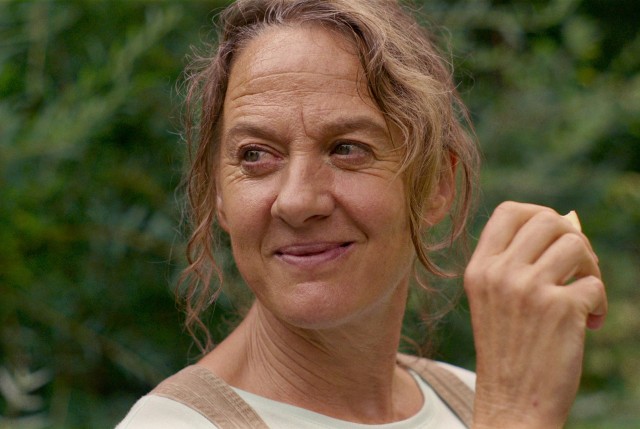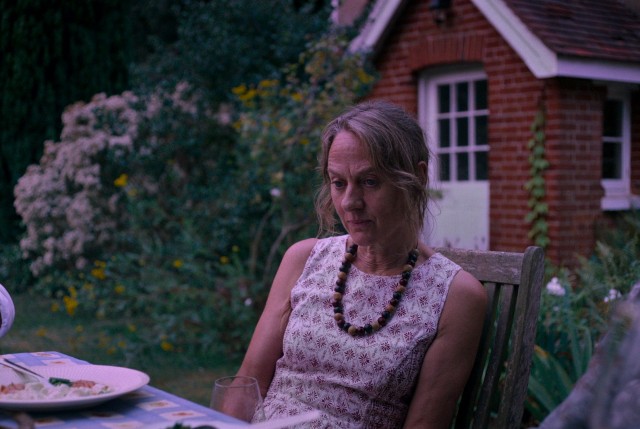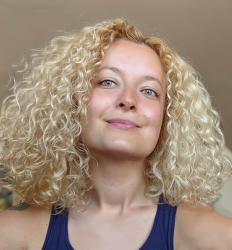When I was a teenager, the very thought of people over the age of 50 being intimate was enough to make me nauseous. As the years have gone by, however, I have grown to appreciate the fact that sexual desire doesn’t die along with the pigment cells in the hair, nor does it fade with the appearance of wrinkles. In fact, if my own sex life is something to go by – starting with some pretty traumatic and clumsy sex in my teens, followed by cripplingly self-conscious and highly intoxicated liaisons in my twenties, and finally finding the confidence to demand what I want from my sexual exploits in my thirties – the future of sex is certainly looking bright! But if that’s the case, why are there so few films that feature characters over a certain age, displaying any physical signs of affection beyond a frigid peck on the cheek?
Returning, by Lucy Bridger (Mothering) is a wise and wistful drama centred around the sexual desires and fantasies of a woman in her early 60s. Unfailingly tender, the thirteen-minute short scrutinises the intimacy and sexual chemistry between three older characters, whilst never othering them or severing the link between their lives and the viewers’. Pivoting between polite and provocative, Returning challenges crass preconceptions and disperses stigmas around sexual consumption and appetite – from its expiry date to who is allowed to experience it. The film’s appeal is so nakedly sincere, it’s impossible not to be moved by it.

“We let our actors improvise and tweak the script, this helped create this natural, authentic-sounding dialogue” – Bridger on working with her cast, including Niamh Cusack (above).
Living in a beautiful house nestled in the lush, British countryside, away from the hustle and bustle of the city, retired teacher Sarah (Niamh Cusack) and her husband Andrew (David Beames) appear to have a blissfully content life together. Andrew is a caring and attentive partner, and even after (presumably) years of marriage, they still enjoy a healthy sex life. This truly is the perfect marriage. Until that is, the new gardener Ed (Simon Shepherd) comes into the picture, just as Andrew takes on an acting job which will keep him away from home for a week. Working closely together during a sweltering heatwave, Sarah soon develops unexpected feelings, leaving her with a difficult decision to make.
When we asked Bridger where she got the idea for the film, she explained that it came from an audition tape she made of her mum’s friend, for a reality TV show. “In her tape, she talked about how she retired, how her children had moved away, started their own families, and both her parents had passed away” – the director continued. “She had this completely new sense of freedom and wanted to try something new. I admired this sense of adventure in her, but I also thought how there must be something daunting about that transition. It reminded me of leaving school or University when the world is all yours but you have no idea what to do.”

“I wanted to represent a complicated older woman with sexual desire who didn’t fit into a mould” – Bridger explains her motivations for making Returning
It’s this notion of going through a transition, that makes Sarah’s character compelling to a wide audience made up of young, old and everyone in between, and Cusack embodies her with such conviction you can barely call it acting at all. She is quietly confident and poised, and there’s a palpable sense of serenity in her routined, picture-perfect life, which is most evident in the scenes where she is alone. Even the masturbation scene, which could’ve easily had us hardened cynics giggling like schoolchildren at the back of the class, is somehow both sensual and mundane. This isn’t an old lady doing something she shouldn’t be. It’s a woman exercising her right to feel pleasure.
It’s also the silent moments she shares with Ed that are the most affecting and erotically charged in the film – when they’re quietly planting together, close enough to touch, when they’re looking at the trees in contemplative silence, or when they’re having lunch, carefully avoiding eye contact. And there is nothing matronly about these moments of palpable desire. They are cleverly framed by Bridger as an intimate dialogue between the pair that doesn’t need any words at all. Because when one is consumed with burning and all-consuming passion, words are meaningless.
Returning is a deliciously conceived piece of work that uses the universal, timeless language of lust, to convey a simple but powerful message – life never ends, until it actually does. It doesn’t end when you turn 30, nor when you have children or when you retire. And if there’s passion and pleasure for as long as we live, well for me, that’s certainly worth living for.

 Serafima Serafimova
Serafima Serafimova